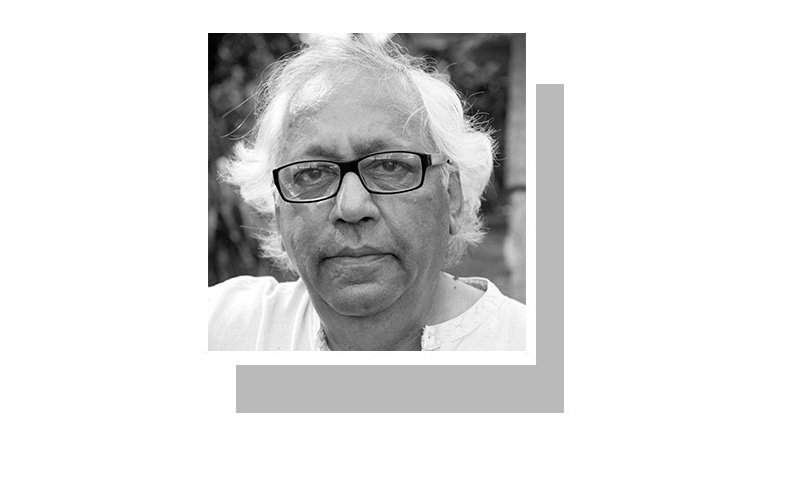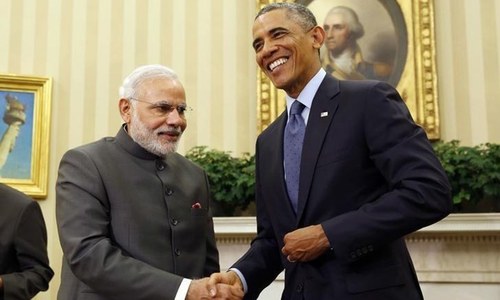
AT a recent hearing of the US Senate foreign affairs committee, the discussion focused on whether or not to cut off aid to Pakistan.
And a few days ago, a State Department spokesman denied that relations between the two countries had hit their lowest point. We’ve all heard this kind of talk in Washington before, and will no doubt do so again. The reality is that Pakistan’s relationship with the world’s biggest superpower has been rocky for a long time, and shows no signs of improvement.
As the American mantra urging us to ‘do more’ against militants sheltering in our tribal areas falls on deaf ears, we insist that we have already sacrificed thousands of lives in our war against jihadists. But this is a dialogue of the deaf, with each side speaking at each other, but refusing to actually listen.
Pakistan’s ties with the US show no signs of improvement.
Despite pretending to be allies, the truth is that our relationship with the Americans has always been strictly transactional. In the earliest phase of Pak-US ties, in exchange for being a member of the anti-Soviet alliance, Pakistan’s defence forces were given modern arms.
Of course, our military leadership was not much concerned with the Cold War: all it wanted was an edge against the Indian military, and only modern US weaponry could offset our foe’s numerical advantage.
A retired three-star general once told me that we joined the Cento and Seato military pacts after Ayub Khan visited Ankara in the mid-1950s and was shown Turkey’s American-supplied arsenal. In the general’s words, “Ayub Khan started drooling at the sight of all the Patton tanks”. Apparently, he was told by his Turkish counterparts that if he wanted the same equipment for Pakistani forces, all he had to do was join the American-sponsored pacts.
But the pro-Western stance predates Ayub Khan’s rise to power. Both Jinnah and the country’s first prime minister, Liaquat Ali Khan, were educated in England. And there is some evidence that before Partition, Jinnah thought Pakistan could be a British ally, whereas Congress had declared India would be neutral once it was independent. Despite Nehru’s links to Britain, Congress was a left-oriented party that had fought the colonial power for decades.
Many today wish Pakistan had not entered into Western alliances, and blame Liaquat Ali Khan for visiting Washington instead of Moscow. But this misses the point that the USSR had been devastated in the war, and was in no position to give the kind of aid we have received from the US.
A glance at the economic and military assistance flowing from Washington is revealing. Between 1951 and 2011, Pakistan received several billion dollars, but a closer look at the figures reveals that these funds — especially the military component — were often turned off for long periods. Thus, military supplies were negligible during the 1965 Indo-Pak war until the early 1980s when Pakistan was once again Washington’s blue-eyed boy after the Soviets invaded Afghanistan.
This long hiatus was viewed by many Pakistanis as a stab in the back. The military, looking for excuses for its debacle in 1965, blamed the US for abandoning us in our hour of need. However, there was a clear clause in the Pak-US agreement that stipulated that American military equipment was to be used only against communist aggression.
The other reason for sanctions was our nuclear programme. While American leaders turned a blind eye to the uranium enrichment that was going on at the facility in Kahuta while the anti-Soviet war raged in Afghanistan, sanctions kicked in very soon after the Soviet retreat. Even delivery of the F-16s we had paid for was blocked.
All this fed into the public perception of a perfidious, fair-weather friend. A third irritant in this rocky relationship was the constant criticism Pakistan faced from American leaders as well as the media about our poor human rights record, and our frequent military interventions.
And now, of course, we are accused of not cooperating with the Americans over the Taliban threat in Afghanistan, and of allowing the Haqqani network sanctuary in our tribal areas. Thus, we are viewed in the United States as a two-faced ally that accepts billions of dollars, and yet allows American enemies to operate freely on our soil.
This perception misses the point that American security concerns do not necessarily overlap with ours. Pakistan is concerned with a post-US Afghanistan when Kabul could become New Delhi’s ally, thus encircling Pakistan. To counter this, Pakistan needs powerful friends in Afghanistan. And you don’t make friends by, allegedly, killing them.
It is this mismatch of expectations and repeated disappointments that have brought Pak-US relations to where they are now. Lacking any deep common interests beyond security concerns, it is likely that as American ties with India blossom, our old alliance will wither.
Published in Dawn, September 17th, 2016












































